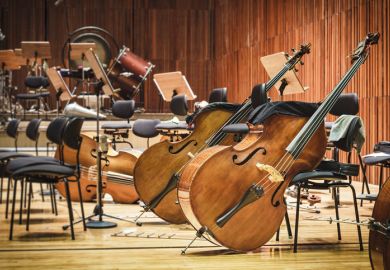Since the publication of Shostakovich's forged memoirs, Testimony, in 1979, discussions about his music have been dogged by politics to an unprecedented degree. Scholarly work on his life and music has progressed, but slowly: access to archives is more restricted now than it was in the years immediately following the demise of the Soviet Union.
Not that there was ever a flood of eager Western scholars trying to gain access to Shostakovich manuscripts; Western academia has been perversely cautious about taking seriously a relatively "conservative"
composer who was such a blatant box-office success. Happily, attitudes have been transformed since the 1970s, and there is now a thriving international community of Russian music scholars. For the non-specialist music lover, however, matters have been far less complicated: Shostakovich's music has been available on LP and CD since the 1930s and, since the advent of the web, fans of his music from all over the world are able to meet online to share information and opinions.
It is clear that Brian Morton's new biography is not a scholarly work; it has no footnotes or bibliography, for instance. It could have been written very quickly indeed by someone who had read a handful of books on Shostakovich and listened to some major works; it is not the result of new research, or even of reading the latest scholarly writing.
It is reassuring to see Laurel Fay's name on the back cover, though the quotation ascribed to her actually comes from David Fanning's article on Shostakovich in T he New Grove Dictionary of Music and Musicians (wrongly ascribed to Fay in the Shostakovich Wikipedia article, though this has now been corrected). Unfortunately, it is clear that Ian MacDonald's The New Shostakovich (Oxford University Press, 1991) has been a constant point of contact, and this is troubling, for MacDonald's book has been thoroughly demolished, and rightly so, for its wealth of inaccuracy, musical illiteracy and not least its infantile insistence that Shostakovich's music can be broken down into constituent parts that either equal groups of three (in which case they represent The People) or two (Stalin). To find Morton recycling assumptions that are not only absurd but discredited is profoundly depressing. Equally so is his uncritical use of Testimony ; despite his token words of caution regarding its lack of proven authenticity, Morton continues to quote freely from it. He appears not to know the damning evidence unearthed by Fay that proves that the author of the "memoirs", Solomon Volkov, tampered with the manuscript pagination of Testimony , claiming to his American publisher that Shostakovich had signed the first page of each chapter, when in fact he had signed only pages that contained previously published - and totally innocent - material. The politically explosive content of the first page of Testimony was unsigned, slotted in before the signed page. Fay's findings have been available in English since 2004 and have been fairly well disseminated - Morton's apparent ignorance of it is inexcusable.
There will doubtless be many who would enjoy this book as a light read and who would see no harm in it. Why not write a coffee-table book on a great composer, dwelling lightly on key moments in his career and not pestering the reader with footnotes and scholarly information? If such a book can achieve all that and still be accurate and honest, there would be no problem. But when the author of that book has been too lazy to keep up to date with the most basic research on the composer, has relied on discredited and feeble sources for his information and ideas and fills the book with so many inaccuracies that it would be frankly superfluous to list them, then there is a problem.
Readers with a casual interest in Shostakovich will be spoon-fed ancient cliches, misapprehensions and myths; those better informed will quickly realise that this writer cannot tell them anything new. Heaven forbid that students should use it: even GCSE music students deserve better than this.
After all, although we do not expect 16-year-olds to read the latest academic articles, we do not expect them to use textbooks that recycle inaccurate information and that are 20 years out of date. And scholars who have been trying to combat the persistent distortions of Shostakovich's life and music in popular music writing will read it and despair. For now here is yet another unreliable biography: one targeting the non-specialist audience that scholars have been trying to reach.
What makes this book even more disappointing is that it is such a missed opportunity. The Western world probably does need a short and clear biography of Shostakovich: a sort of extended programme-note or radio broadcast that lays out the main facts of his career in a reader-friendly non-academic format. But what it has now is a "biography-lite" littered with mistakes and echoes of Volkov and MacDonald that will mislead readers further.
Though it was surely written with the best of intentions, a book such as this should serve as a caution to all writers who assume that reading a handful of books and browsing on the web qualifies them to be potential biographers. First-year music students do more research than this for a 2,000-word history essay; it is a shame that Morton did not feel the need to bother.
Pauline Fairclough is a lecturer in music, Bristol University.
Shostakovich: His Life and Music
Author - Brian Morton
Publisher - Haus Books
Pages - 138
Price - £13.72
ISBN - 1904950930
Register to continue
Why register?
- Registration is free and only takes a moment
- Once registered, you can read 3 articles a month
- Sign up for our newsletter
Subscribe
Or subscribe for unlimited access to:
- Unlimited access to news, views, insights & reviews
- Digital editions
- Digital access to THE’s university and college rankings analysis
Already registered or a current subscriber?



